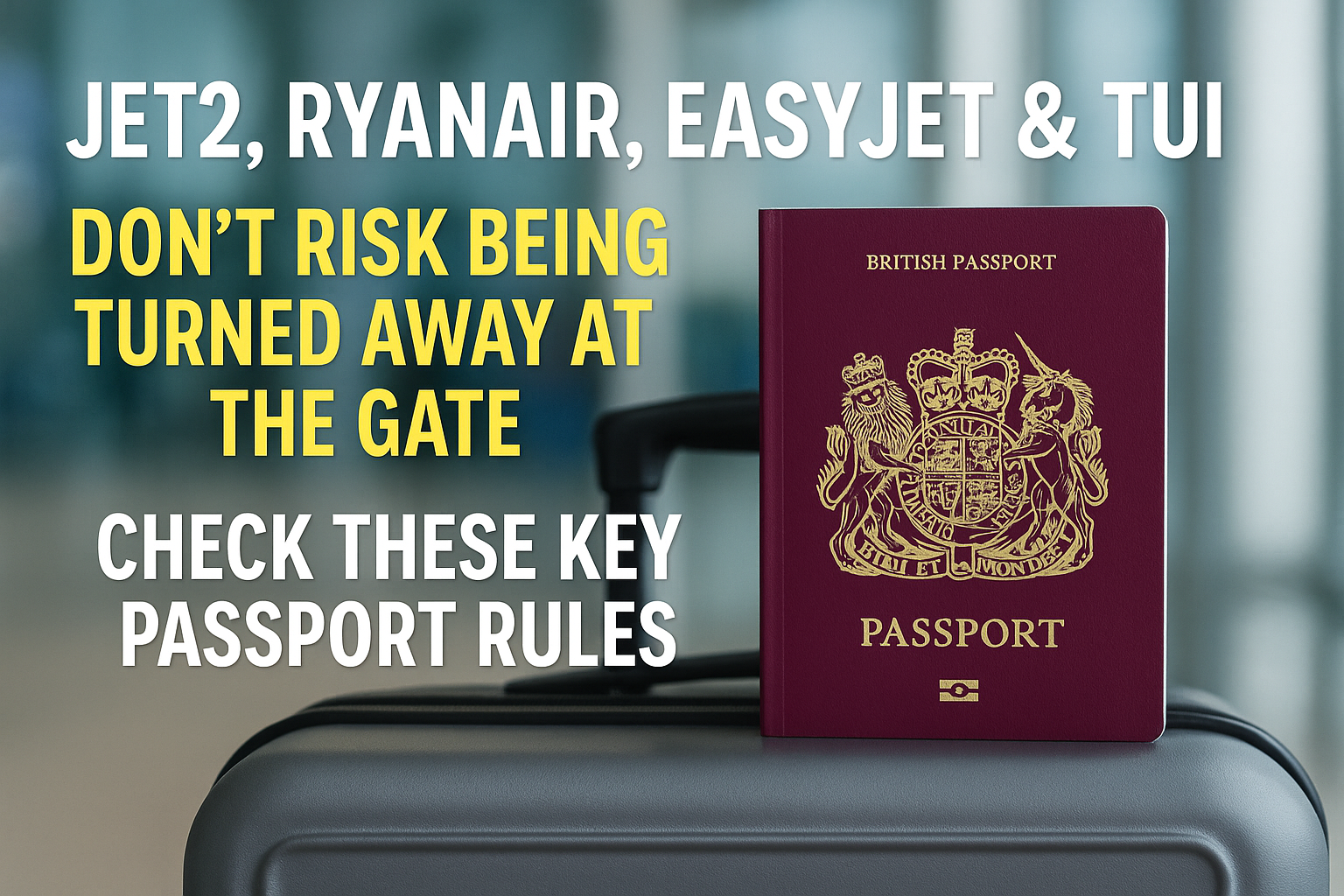As the UK’s summer holiday season hits full stride, travellers heading to European hotspots with airlines such as Jet2, Ryanair, EasyJet, and TUI are being warned about critical passport validity rules that could derail their vacations. British nationals flying to popular destinations including Spain, Italy, France, Greece, and Portugal face the risk of being turned away at the airport or denied entry abroad due to overlooked passport regulations.
Despite growing post-Brexit travel awareness, confusion remains around two key passport requirements: your passport must be no more than 10 years old on your arrival date and it must be valid for at least three to six months after your intended return—depending on the destination country.
According to UK government travel advice and EU Schengen rules, this applies to travellers entering the EU from non-EU countries like the UK. For instance, Spain, a top destination for British holidaymakers, demands that passports be issued within the last 10 years and valid for at least three months beyond the date of departure from the Schengen Area.
“If you’re heading on a summer getaway soon, it’s absolutely crucial to check your passport’s validity well in advance,” says Alvaro Iturmendi, travel insurance expert at Confused.com. “Even if your passport appears in date, it could still be rejected if it was issued over 10 years ago or doesn’t have sufficient validity left.”
Why 10-Year Passport Limits Matter
The misconception that a passport remains valid until its printed expiration date is costing some travellers dearly. The UK previously issued passports with validity over 10 years due to time carryovers on renewals. However, the EU no longer recognises passports older than 10 years, regardless of the expiry date.
Failing to meet this rule could result in boarding refusal at the gate or denied entry at immigration. Airline staff have full authority to refuse passengers who don’t meet entry requirements, and such incidents are increasing during peak travel periods.
“It’s not just a minor inconvenience,” warns Iturmendi. “Getting turned away can mean missing your holiday altogether, and your insurance may not cover it.”
Travel Insurance and Passport Problems
Most standard travel insurance policies do not cover losses incurred due to passport issues, including being refused boarding or entry. Missed flights, accommodation, and tour bookings are generally non-refundable in such cases, meaning travellers may face thousands in out-of-pocket costs.
To prevent costly disruptions, travellers are urged to:
- Check the passport’s issue and expiry dates as soon as travel is booked
- Renew passports at least 10 weeks in advance, especially during peak summer demand
- Use the UK government’s passport validity checker or check with the relevant embassy
Save on Roaming Costs: Consider eSIM Technology
While preparing for international travel, it’s also worth considering mobile roaming costs, which can be unexpectedly high post-Brexit. UK travellers visiting Europe no longer benefit from EU-wide free roaming, and charges vary significantly by provider.
Simrat Sharma, mobile expert at Uswitch, advises switching to an eSIM:
“eSIMs make it easier to connect to local networks without inserting a new SIM card. They’re often cheaper and offer better data rates compared to international roaming packages from UK providers.”
An eSIM allows you to download a digital mobile plan directly to your phone, often at local prices, without the hassle of switching physical SIM cards. Many apps and websites now offer pre-paid travel eSIMs tailored for European destinations.
For frequent travellers or those hopping between countries, this is an excellent way to control data usage and avoid bill shock upon returning to the UK.
Quick Checklist for UK Holidaymakers in 2025:
1. Check Your Passport Now
Ensure it’s no more than 10 years old and valid for at least 3-6 months after your trip.
2. Renew Early
Don’t risk delays—apply for renewals at least 10 weeks in advance, especially in summer.
3. Be Insurance-Aware
Standard travel insurance won’t cover passport-related disruptions. Double-check coverage.
4. Set Up an eSIM
Ditch roaming fees by switching to an eSIM and accessing local mobile rates abroad.
5. Use Trusted Tools
Leverage free tools like the UK passport checker or consult the embassy of your destination country.
The Bottom Line: Avoid Preventable Travel Disasters
With tens of thousands of UK residents flying to Europe weekly, failure to check a seemingly minor detail like your passport’s age can result in major holiday disruption. Border policies have tightened since Brexit, and travellers must take personal responsibility to meet these new requirements.
Whether flying to Alicante with Jet2, exploring the Greek islands with TUI, or heading to Milan with EasyJet, preparing early can make all the difference. Check your documents, renew if needed, and avoid last-minute surprises. Add in a smart eSIM solution, and you’ll enjoy a smoother, more connected holiday—without financial setbacks.
For more travel news like this, keep reading Global Travel Wire
















